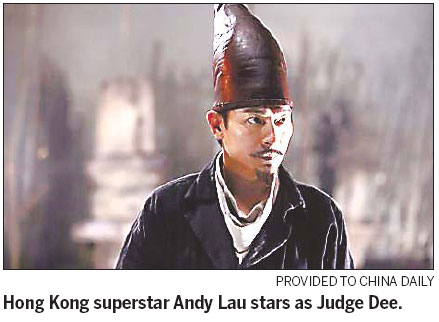Life and Leisure
Judge Dee, native son better known in fiction
By Raymond Zhou (China Daily)
Updated: 2010-09-03 08:13
 |
Large Medium Small |

Related story: Noodel acrobatics - Shanxi style
Di Renjie lived in AD 630-700. He did not become world famous until the 1950s when Robert van Gulik began to write and publish a series of detective novels based on him. Now, after numerous dramatizations, a big-budget movie starring Andy Lau is coming out late September, by which time Judge Dee will probably be a household name on a par with Judge Bao.
While Judge Bao is a symbol of righteousness, Judge Dee, at least the fictional version, is mostly known for his intellect. He possessed a Sherlock Holmes-like ability to solve mystery cases, injecting a breath of fresh air into the common practice of staring down and torture in China's court of yore. Even when he had to hand down the sentence of "slow slicing", he would add a humane twist by ordering the fatal cut first.
In other words, Judge Dee is an ancient hero born out of Chinese history but tailor-made for the world.
In real life, Di Renjie was a prime minister under the empress Wu Zetian of the Tang Dynasty (AD 618-907). He probably did not deal with day-to-day cases as a municipal judge would. Even when he was a local magistrate, he was more a politician upholding principles than a guardian of law. In some provinces, he upturned thousands of cases involving people who were persecuted. Resisting political pressure, he righted wrongs and gave back lives to those who had offended officialdom.
He was the rare Chinese official who dared to speak the ugly truth to his boss. In places where there were ethnic tensions, he advocated reconciliation, and when he could talk directly to the empress, he often proposed the pardon of officers of other ethnicities.
Dutch Sinologist van Gulik was not the first to chronicle - or more accurately - fictionalize Di's feats. A form of "folk novels" appeared as early as the Ming Dynasty (1368-1644), and van Gulik translated some into English. He followed it up with his own yarns.
Hollywood took notice. In 1969, the first television adaptation appeared, using six of van Gulik's stories. Another attempt was made in 1974, with an all-Asian cast. When China opened up 30 years ago, the spigot was turned on and van Gulik's novels were made available in Chinese translation and constantly found their way to the screen - to the point that few now can distinguish between the real Di Renjie and the dramatized hero.
Di Renjie, the super judge, was a native of Taiyuan, now capital of Shanxi province. Chen Jiejun, a teacher at a local law school, is proud that Taiyuan has produced such a clean and upright official: "Di Renjie epitomizes the moral virtues of our people, and he is also astute and resolute."
The Di village, now part of the city proper, has few traces of the native son. "Few here have the surname Di," says Dang Zhijun, a migrant worker. There is a park in Di's honor, though, and in it is a tree supposedly planted by Di's mother and also a statue that commemorates the man whose image is now more visible on the screen.